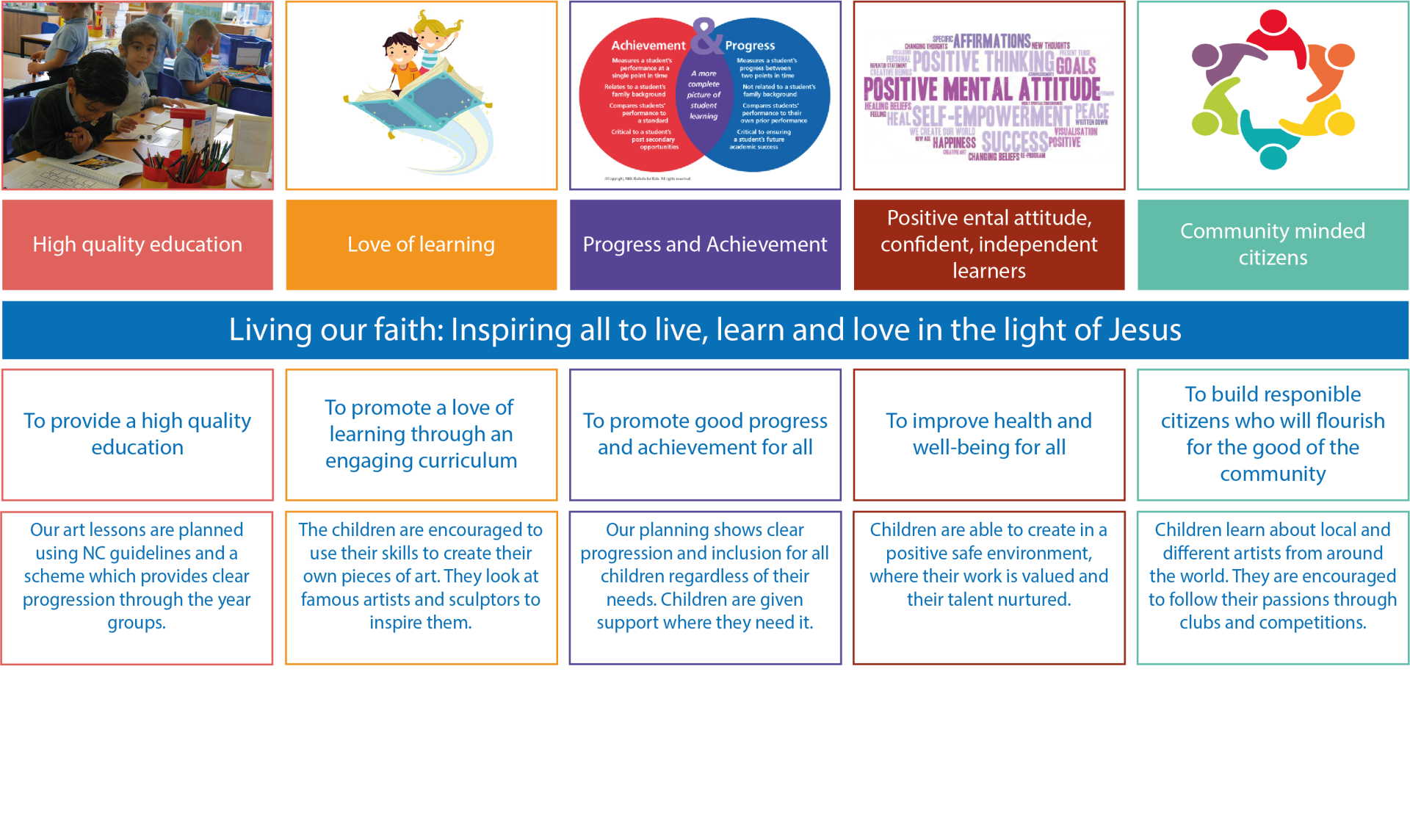St PaulinusCatholic Primary Academy
Inspiring all to live, learn and love in the light of Jesus
We are proud to work with all the Catholic schools across our two local authority areas, particularly as the Trust grows and benefits from the expertise and knowledge that other schools joining in the future will bring.
Visit UsArt is a foundation subject of the National Curriculum, which gives our children amazing opportunities to express some of the highest forms of human creativity and develop cultural capital. Through art, children will be gaining the knowledge and skills to investigate, experiment and create their own pieces of work, expressing their own personalities and experiences. Art takes an important role in history and gives our children the opportunity to reflect on this and the way in which it has and continues to shape our own culture. The importance of art is evident throughout our school as we plan and deliver lessons, focussing on important key skills and aspects of art. We believe teaching and learning is most effective when the environment celebrates innovation and is inclusive of each other’s values, attitudes, and feelings. Our aim is for our children to become confident artists, comfortable in expressing their thoughts and emotions through the medium of art.
Art is a key part of our broad and balanced curriculum at St Paulinus. As a school we believe each child has the right to knowledge and skills in order to access art at the highest level before the end of Key Stage 2. Children will have the confidence to be expressive and demonstrate creativity at the very best of their ability. This includes the skills to take part in many different mediums of art and developing a deep understanding of art’s role in our own culture and history. These goals are planned for in a well-structured way through our long-term plan, influenced by the Suffolk Art Scheme, building on the skills taught throughout each key stage. Skills of observation and evaluation are taught so that the children at St Paulinus are able to master their techniques through self-improvement and motivation. We aim for all children at St Paulinus to develop a life-long love of art.
Discrete art lessons are carried out weekly, focussing on a particular artistic skill/technique. Art skills are taught in this way to provide children the opportunity to participate in the artistic journey from the very beginning of an idea, building upon the knowledge over time to the creation of their final piece. Children are given the time to explore their ideas and record their experiences in the moment. This could be through discussion, sketchbook work, larger scale, and collaborative pieces. The content of art lessons are influenced by the Suffolk Art Scheme; where specific artistic skills are taught discretely, encompassing the roles of various artists through history and their influence on our own culture and those of the wider world. These plans are carefully adapted for the needs of the pupils each year. Art is also undertaken through cross curricular lessons, where further techniques are used and opportunities to further develop and apply artistic skills, taught in discrete art sessions. Artistic appreciation is modelled by teaching staff and provides further opportunities to develop oracy, as children discuss not only their own and peers’ artwork, but that of other cultures.
Within St Paulinus, progress of children is measured using both formative and summative assessments. During lessons, staff use formative assessment to support and advise pupils in the moment. This allows teaching staff to assess whether pupils need further support or extending through more challenge. This also provides opportunity for pupils to follow advice, make improvements or develop their ideas at that exact moment in time. Summative assessment is used to assess each pupil, using assessment criteria developed in line with the scheme and the National Curriculum. This data is evaluated on a termly basis to evaluate any strengths or gaps in attainment. This informs future planning, and support is put in place for those that are not achieving in line with peers and increased challenge to further extend those that are exceeding expectations. Further information is gathered through pupil voice such as questionnaires and discussion. End of year assessments are carried out, identifying the level in which pupils are working. Planning is reflected upon throughout the year and is used to help guide planning for the consecutive year.

The Louvre – https://www.louvre.fr/en/online-tours
The British museum of art – https://britishmuseum.withgoogle.com/
The Metropolitan museum of art –
https://www.metmuseum.org/art/online-features/metkids/
Please also find below links to some fantastic free resources to inspire
your imaginations and creativity.
National Gallery of Art – Children’s Page
Examples of outstanding pieces of art completed by other children. Also a
platform for ideas for your own art projects.
Here you can play fun games and print off your own resources.
Free printables for all occasions. Greetings cards, colouring pages and
craft ideas.
Lots and lots of fun activities, crafts and games to take part in art at home